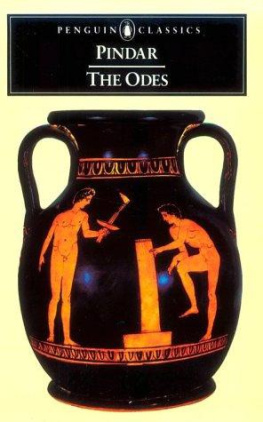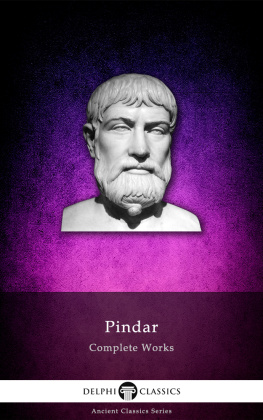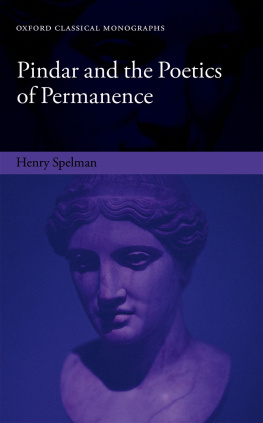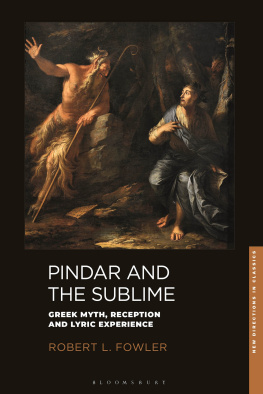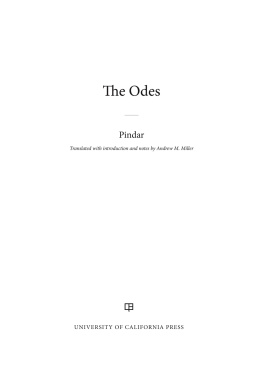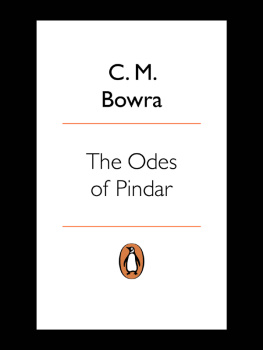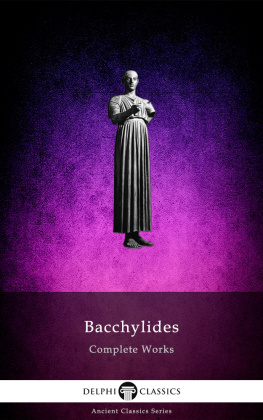OXFORD WORLD'S CLASSICS
THE COMPLETE ODES
P indar lived in the Boeotian city of Thebes, about 40 miles north west of Athens. Born in 518 BC (he died some time after 446) and a contemporary of the tragedian Aeschylus, he lived during the Persian Wars and subsequent growth of the Athenian empire, and was ranked in antiquity as Greece's greatest lyric poet. What we know about him is mostly derived from his poetry itself. He is most famous for his epinician or victory odes, composed for winners in the ancient athlet ics festivals and sung to music by a chorus. His patrons included the Sicilian tyrants Hieron I and Theron, Arcesilas IV king of Cyrene, Megacles uncle of Pericles, and a number of other wealthy and powerful families who commissioned odes from him, but he was on particularly friendly terms with victors from the island of Aegina, for whom a quarter of the forty-five surviving odes were written. He wrote many other poems, for both states and individuals, but all of these survive only in fragments.
A nthony V erity was formerly Headmaster of Leeds Grammar School and Master of Dulwich College. In his retirement he acts as an educational consultant. He has translated Theocritus' Idylls for Oxford World's Classics.
S tephen I nstone is an Honorary Research Fellow at University College London.
For over ioo years Oxford World's Classics have brought readers closer to the world's great literature. Now with over 700
titles from the 4,ooo-y ear-old myths of Mesopotamia to the twentieth century's greatest novels the series makes available
lesser-known as well as celebrated writing.
The pocket-sized hardbacks of the early years contained introductions by Virginia Woolf T. S. Eliot, Graham Greene,
and other literary figures which enriched the experience of reading. Today the series is recognized for its fine scholarship and
reliability in texts that span world literature, drama and poetry, religion, philosophy and politics. Each edition includes perceptive
commentary and essential background information to meet the
changing needs of readers.
OXFORD WORLD'S CLASSICS
PINDAR
The Complete Odes
Translated by
ANTHONY VERITY
With an Introduction and Notes by
STEPHEN INSTONE
OXFORD UNIVERSITY PRESS
OXFORD UNIVERSITY PRESS
Great Clarendon Street, Oxford 0X2 6 dp
Oxford University Press is a department of the University of Oxford.
It furthers the University's objective of excellence in research, scholarship,
and education by publishing worldwide in
Oxford New York
Auckland Cape Town Dar es Salaam Hong Kong Karachi
Kuala Lumpur Madrid Melbourne Mexico City Nairobi
New Delhi Shanghai Taipei Toronto
With offices in
Argentina Austria Brazil Chile Czech Republic France Greece
Guatemala Hungary Italy Japan Poland Portugal Singapore
South Korea Switzerland Thailand Turkey Ukraine Vietnam
Oxford is a registered trade mark of Oxford University Press
in the UK and in certain other countries
Published in the United States
by Oxford University Press Inc., New York
Translation Anthony Verity 2007
Editorial material Stephen Instone 2007
The moral rights of the authors have been asserted
Database right Oxford University Press (maker)
First published as an Oxford World's Classics paperback 2007
All rights reserved. No part of this publication may be reproduced,
stored in a retrieval system, or transmitted, in any form or by any means,
without the prior permission in writing of Oxford University Press,
or as expressly permitted by law, or under terms agreed with the appropriate
reprographics rights organization. Enquiries concerning reproduction
outside the scope of the above should be sent to the Rights Department,
Oxford University Press, at the address above
You must not circulate this book in any other binding or cover
and you must impose this same condition on any acquirer
British Library Cataloguing in Publication Data
Data available
Library of Congress Cataloging in Publication Data
Pindar.
[Works. English. 2007]
The complete odes / Pindar; translated by Anthony Verity; with an introduction
and notes by Stephen Instone.
p. cm. (Oxford world's classics)
Includes bibliographical references.
ISBN-13: 978-0-19-280553-9 (alk. paper)
1. Pindar Translations into English. 2. Laudatory poetry, Greek Translations into English.
3. AthleticsGreece Poetry. 4. Games Greece Poetry. I. Verity, Anthony. II. Instone, Stephen. III. Title.
PA4275.E5P3 2007 885'.0109 dc22 2006039673
Typeset by Cepha Imaging Private Ltd., Bangalore, India
Printed in Great Britain
on acid-free paper by
Clays Ltd., St Ives pic
ISBN 978-0-19-280553-9
13579 10 8642
CONTENTS
Pythian
Olympian
Olympian 14
PYTHIANS
Olympian 7
Olympian 8
Olympian 9
Olympian 10
3i
Olympian 11
Olympian 12
Olympian 3
Olympian 4
Olympian 5
Introduction
Vll
Translator's Note
xxii
Select Bibliography
xxiii
Chronology
xxviii
THE ODES
OLYMPIANS
Olympian 1
Pythian 3
Pythian 4
Pythian 5
Pythian 1
Olympian 13
Olympian 6
4i
-I
O'
VI
Contents
Nemean
Isthmian
Nemean io
Nemean
III
Isthmian 3
Isthmian 4
Isthmian 5
Isthmian 6
Isthmian 7
Isthmian 8
Nemean 11
ISTHMIANS
Isthmian 1
Nemean 3
Nemean 4
Nemean 5
Nemean 6
Nemean 7
Nemean 8
Pythian 6
Pythian 7
Pythian 8
Pythian 9
Pythian 10
Pythian 11
Pythian 12
NEMEANS
Nemean 1
N
N
~
O
00 00
-I
Explanatory Notes
INTRODUCTION
Pindar's Odes
The victory ( epinician') odes of Pindar (518-r.438 BC) celebrate athletes victorious in the ancient games. Pindar did not invent this type of poetry the lyric poets Ibycus (sixth century) and Simonides (r. 5 56-466) had composed poems celebrating athletics victors, of which
fragments survive;
Bacchylides, Simonides' nephew and Pindar's
contemporary, also composed them, and thanks to papyrus discover ies fourteen of his victory odes now exist in varying degrees of com
pleteness.
But Pindar perfected the genre and forty-four of his victory
odes survive in their entirety, and, whereas Bacchylides' odes were vir
tually
completely lost until their
rediscovery on papyrus in 1896,
Pindar's odes were handed down through the ages in a continuous manuscript tradition; they alone, therefore, of ancient Greek victory odes were an influence on the form of the ode in Renaissance poetry.
Most, but not all, of the odes follow a typical pattern and contain standard ingredients: direct praise of the victor and his home town, general moralizing, a myth about gods and heroes that has been tailored to be relevant to the victor, something about the performance of the ode and the poet himself. The mythical section is often the main part of the ode, and Pindar liked if possible to draw on myths connected with the victor's home town, some of which may have pre-existed as local stories. He was also influenced, both for myths and moral sen timents, by earlier epic poetry, especially Homer's Iliad, Hesiod (not only his Theogony and Works and Days, which survive in their entirety, but also other now fragmentary Hesiodic poetry, for example Catalogue of Women and Precepts of Chiron) and the body of post-Homeric epic known as the epic cycle'.
Victory odes belong to the genre of Greek poetry known as choral lyric' because they were sung by a chorus of singers to musical accom paniment on a special public occasion. The other type of Greek lyric poetry is the more personal lyric which the poet sang solo to an infor mal gathering, represented by Archilochus, Sappho, and Anacreon for example.
Next page
